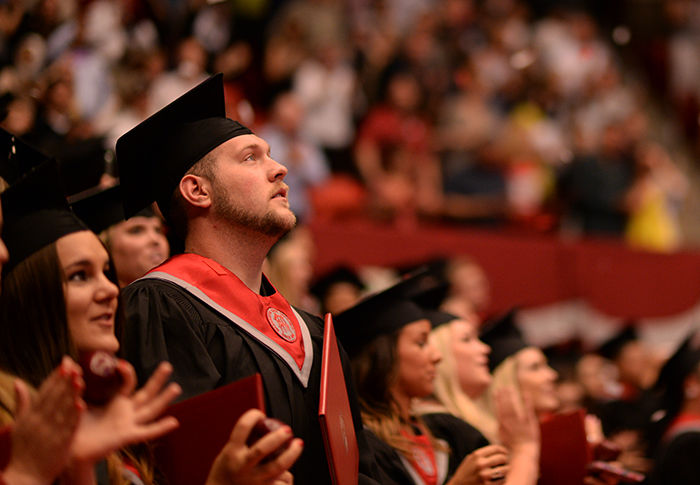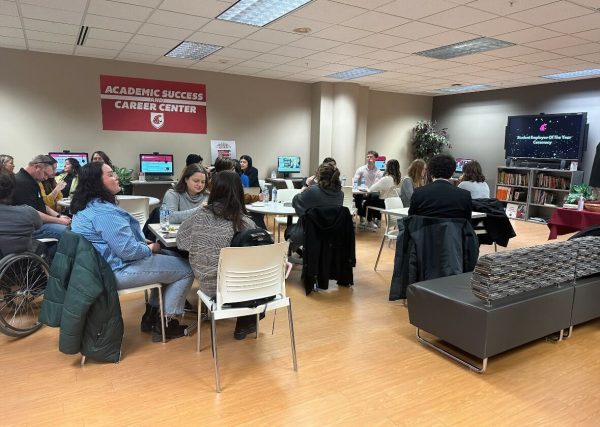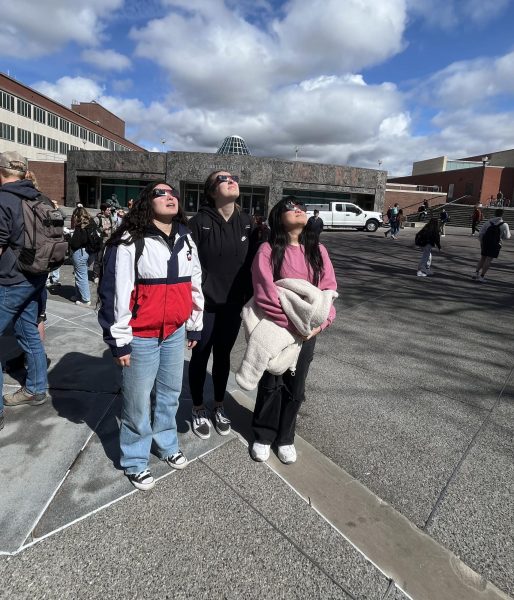Graduation to go without speaker
In order to keep this year’s commencement within the scheduled time, WSU chose not to recruit a speaker.
May 5, 2017
No commencement speaker will address the spring WSU graduates on Saturday for the first time since 1999, after officials acknowledged scheduling and financial limitations prompted cuts to the ceremony.
Commencement Coordinator Teri Hansen said the main reason for the change is time. Each college’s commencement would have gone late, setting off the schedule of the whole day, if they had a speaker address the graduates as well.
“As the student population has grown, so do those attending commencement,” Hansen said, “and it takes longer to read 1,000 students as compared to 800 per ceremony.”
They looked through the ceremony for a way to cut down on time and decided cutting out the speaker was the best course of action, she said.
“Our groups are getting so big, it was going over the two-hour time slot,” Hansen said.
There are three ceremonies throughout the day, splitting up the colleges into equally populating ceremonies. The College of Arts and Sciences is the only college with its own time slot.
The commencement ceremonies with speakers were running at almost two-and-a-half hours during a two-hour time slot, Hansen said.
She said she cut back the script of the ceremony to save as much time as she could over the past couple of years, but they still ran into the issue of recognizing too many people in a short amount of time.
“When you run ceremonies back-to-back in the same day and they start going over [by] 20 to 30 minutes, then everything is affected,” Hansen said.
They tried the ceremony without a speaker for the first time during December’s commencement and cut down the ceremony time by 15 minutes, she said.
“We’re giving it a shot,” Hansen said.
Hansen has been commencement coordinator for 19 years and said WSU sometimes struggles to recruit commencement speakers.
“Some colleges will pay up to $40,000 and get high-profile speakers,” Hansen said. “WSU does not have that luxury.”
Funds for commencement speakers have come from the colleges for the spring ceremony and the president’s office in the fall, Hansen said. They never came out of the commencement budget, she said.
“I do not get the speakers,” Hansen said. “I just know my budget has never paid for one and that had nothing to do with why we do not have one.”
There has not been much feedback on this decision yet, she said, but one person did come up to Hansen after the December ceremony and told her they felt cheated. So far, this is the only complaint they have received, she said.
Former ASWSU President Taylor Christenson and former GPSA President Melanie Thornton will both still speak during the ceremony, Hansen said, as well as President Kirk Schulz, but there will not be an additional formal speaker.
She said that of all the scenarios they discussed, this was the least disruptive and most valuable way to cut time out of the commencement ceremonies and give time to the students.
“It’s about them, it’s about the students,” she said. “It’s their day to celebrate.”
WSU allows graduating seniors to decorate their caps and gowns as long as it doesn’t distract or get in anyone else’s way, Hansen said. Some universities don’t allow these decorations, but Hansen likes that WSU does.
“I just love the atmosphere,” she said, “how everyone is happy and upbeat.”
Phyllis Campbell, Pacific Northwest chairman of J.P. Morgan Chase & Co., is currently the last WSU commencement speaker, as she was the only one to speak during the spring 2016 ceremony. Campbell has been a commencement speaker twice, the first time during the 1998 ceremony as a WSU regent.
The spring 2016 ceremony was also the first time since spring 2012 that WSU only hired one speaker. The fall ceremonies typically only have one speaker, but spring ceremonies had at least two, if not three, speakers. Former Gov. Christine Gregoire was the lone speaker at the spring 2012 ceremony and has also been a commencement speaker twice, the first time in 2000.






















